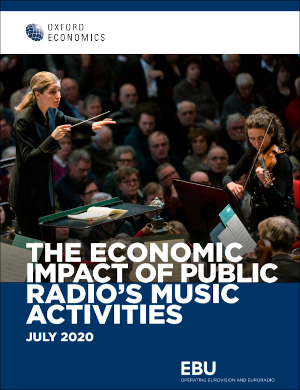Ungated Post | 21 Sep 2020
The economic impact of public radio’s music activities

Public service music radio supports over 50,000 jobs across 48 European countries, taking direct, supply chain and wage-funded spending impacts into account.
This report for the EBU quantifies the GDP and jobs supported by the music radio activities of public service broadcasters in 48 European countries. These activities directly generated some €1.1 billion of GDP in 2018, employing 17,700 staff. A third of these roles are accounted for by orchestras, choirs, and ensembles run by the operators, and direct GDP per job is a third higher than the European economy-wide average.
Taking into account indirect (supply chain) and induced (wage-funded spending) effects too, the total GDP impact is around €3.1 billion, associated with over 50,000 jobs. Half of these jobs are in roles related to music one way or another.
In the EU-27 alone, €850 million of direct GDP is generated by over 12,000 staff. Direct GDP per job, at €69,200, is 19% higher than the EU average. Here, the total GDP impact is some €2.4 billion, associated with over 34,000 jobs. Directly and indirectly, some 19% of employment in the wider EU music and radio services sector is supported by these public service music radio activities.
Our economic consulting team are world leaders in quantitative economic analysis, working with clients around the globe and across sectors to build models, forecast markets and evaluate interventions using state-of-the art techniques. Lead consultants on this project were:
Oxford Economics’ team is expert at applying advanced economic tools that provide valuable insights into today’s most pressing business, financial, and policy issues.
To find out more about our capabilities, contact:
EMEA
Sam Moore
+44 (0)207 803 1415
Email
Americas
Hamilton Galloway
+1 (646) 503 3068
Email
Asia
Rhianne Clark
+65 6850 0112
Email
Related Services

Post
The economic impact of abandoning the WTO
Oxford Economics have been commissioned by the International Chamber of Commerce (ICC) to provide an independent assessment of the economic impact of WTO dissolution. This report details our findings and the assumptions underpinning our analysis.
Find Out More
Post
The economic impact of the sports activities of public service media
This study shows how the sports activities of public service media supported €4.5 billion of GDP and 57,000 jobs across 31 European countries in 2022. The report also highlights wider economic benefits of public service media sports coverage, such as the way in which it leverages sponsorship income for sports bodies.
Find Out More
Post
Global Trade Education: The role of private philanthropy
Global trade can amplify economic development and poverty alleviation. Capable leaders are required to put in place enabling conditions for trade, but currently these skills are underprovided in developing countries. For philanthropists, investing in trade leadership talent through graduate-level scholarships is an opportunity to make meaningful contributions that can multiply and sustain global economic development.
Find Out More